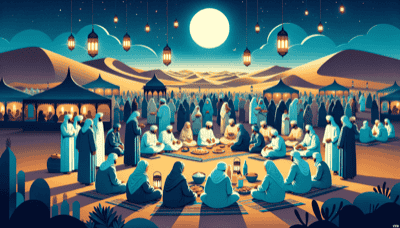We're here to help you keep count of the days to or since a date. Just click the button below and enter your chosen date to get started. Also choose the suggested days or search for a special day above #countingthedays

Overview: Eid al-Fitr, known as the "Festival of Breaking the Fast," is a significant religious holiday celebrated by Muslims worldwide marking the end of Ramadan, the Islamic holy month of fasting. In Oman, a country with deep Islamic roots, this day is celebrated with great reverence and joy.
History: The tradition dates back to the time of Prophet Muhammad, who established the festival as a day of feasting and gratitude to Allah for providing strength during Ramadan. It is also a time for forgiveness and making amends.
Traditions:
Prayers: The day begins with early morning Eid prayers at mosques or large open areas, where men, women, and children gather in large numbers to pray together.
New Clothes: It's customary for Omani people to wear new clothes to signify purity and renewal.
Charity (Zakat al-Fitr): Before the Eid prayers, Muslims are obliged to give charity on behalf of each of their family members. This act ensures that even the poor can celebrate the day with food and clothing.
Feasting: After prayers, families gather for a special celebratory meal that often includes traditional Omani dishes such as shuwa (slow-cooked marinated lamb), harees (wheat mixed with meat), or halwa (a sweet dessert).
Visiting: People visit relatives and friends throughout the day to exchange gifts and well-wishes. It's common courtesy to serve Omani coffee and dates to guests.
Entertainment: Public celebrations include various forms of entertainment such as traditional music and dance performances. Children receive Eidiyah (money or gifts) from elders.
In summary, Eid al-Fitr in Oman is marked by communal prayers, feasting, charity-giving, social gatherings, cultural festivities, and a spirit of joy that brings together communities in celebration after a month of fasting.